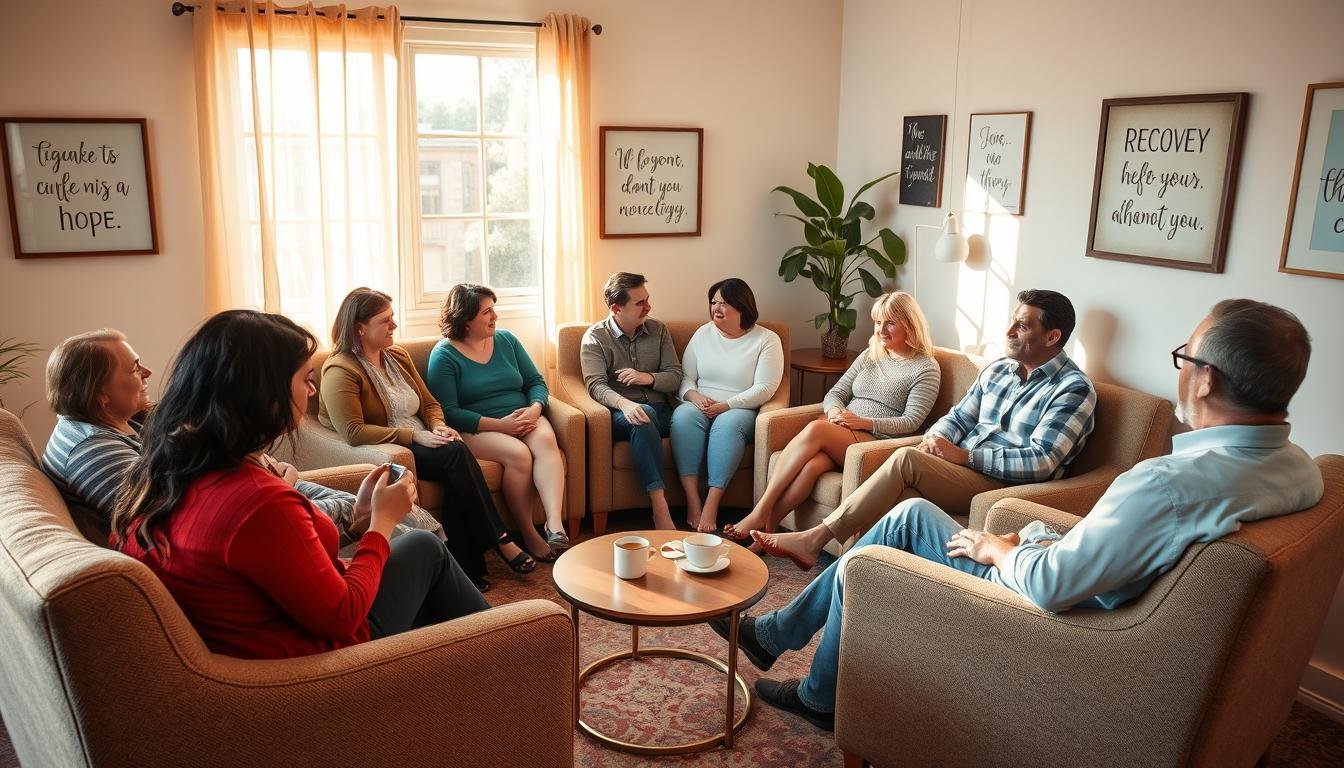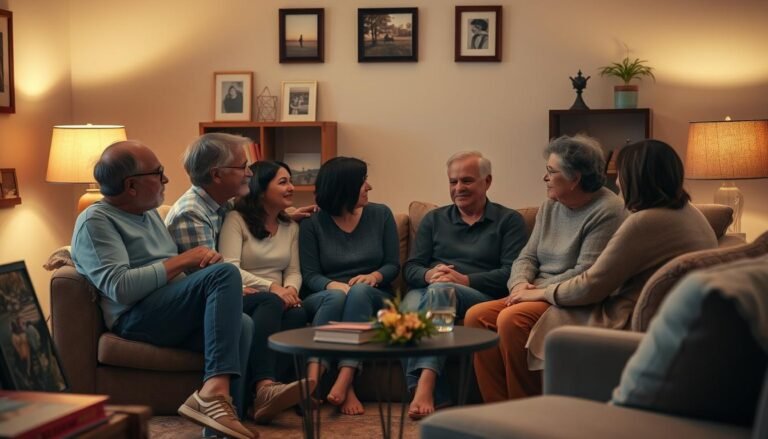Find Local Addiction Support Groups Near You Today
Picture a room with friendly faces sharing similar experiences. This is the essence of addiction support groups. They offer a safe space for those seeking recovery. Here, struggles are understood and successes are celebrated.
Recovery programs come in various forms. They range from 12-step meetings to faith-based gatherings. Each offers unique ways to maintain sobriety and prevent relapse. Finding the right fit for your journey is crucial.
Options include Alcoholics Anonymous and SMART Recovery. These groups cater to different needs and preferences. You’re likely to find one that matches your recovery goals.
Group support is a powerful tool in recovery. It goes beyond one-on-one counseling sessions. These groups work alongside professional treatment. They provide peer support that can be vital for staying sober.
Remember, you’re not alone in this battle. A supportive community is ready to help you. They’ll be there for every step of your recovery journey.
Key Takeaways
- Addiction support groups offer diverse approaches to recovery
- 12-step programs like AA have a proven track record of success
- Group support complements professional addiction treatment
- There are specialized groups for different demographics and needs
- Online meetings provide accessible support options
- Family support groups are available for loved ones of those in recovery
- Local and national resources exist to help you find the right group
Understanding Addiction Support Groups and Their Role in Recovery
Addiction support groups are crucial for recovery. They offer a safe space to share experiences and gain strength from others. These groups come in various forms to meet different needs in addiction recovery.
Types of Recovery Support Meetings
Recovery support meetings offer many options. 12-step meetings like Alcoholics Anonymous (AA) and Narcotics Anonymous (NA) are well-known. They follow a structured approach to recovery.
SMART Recovery provides a science-based program focusing on self-empowerment. Faith-based groups and specialized meetings for specific demographics are also available.
Benefits of Group Support in Recovery
Group therapy and peer support offer many benefits in addiction recovery. Participants gain a sense of community, reducing isolation. They learn practical coping skills from others’ experiences.
Studies show regular attendance at support groups reduces substance use and cravings. The accountability provided by these groups helps maintain long-term sobriety.
How Support Groups Complement Professional Treatment
Support groups work best when combined with professional treatment. Unlike counseling sessions, support groups offer peer-to-peer interaction. This combination creates a comprehensive recovery plan.
Many treatment centers encourage participation in support groups as part of aftercare. This approach enhances the chances of sustained recovery.
| Support Group Type | Focus | Key Benefit |
|---|---|---|
| 12-Step Programs | Spiritual approach | Structured path to recovery |
| SMART Recovery | Self-empowerment | Evidence-based techniques |
| Faith-Based Groups | Religious principles | Spiritual growth in recovery |
| Specialized Groups | Specific demographics | Tailored support |
Popular Addiction Support Groups and Their Approaches
Addiction support groups offer various options for different needs and beliefs. They provide crucial guidance during recovery. You can find the right group for your journey.
12-Step Programs: AA, NA, and Beyond
Alcoholics Anonymous (AA) is the most widespread support group globally. It has over 120,000 groups in 180 countries. AA meetings last 60-90 minutes and use the 12-step approach.
Narcotics Anonymous (NA) applies similar ideas to drug addiction. Both groups encourage sponsorship. A 2013 AA study showed sponsorship improves long-term sobriety.
Faith-Based Recovery Groups
Faith-based groups offer spiritual guidance in recovery. Celebrate Recovery combines Christian teachings with recovery principles. Millati Islami serves Muslims, while Recovery Dharma incorporates Buddhist practices.
Secular Support Group Options
SMART Recovery offers a science-based, four-point program for those preferring a non-religious approach. It focuses on self-empowerment and behavioral change. The group provides free online and in-person meetings.
Secular Organizations for Sobriety (SOS) is another nonreligious option. It emphasizes personal responsibility in maintaining sobriety.
Specialized Groups for Specific Demographics
Some groups cater to specific needs. Dual Recovery Anonymous (DRA) helps those with substance abuse and mental health issues.
Women for Sobriety (WFS) offers female-focused support. They provide in-person meetings, online forums, and phone support. These groups help you find a community that understands your unique challenges.






